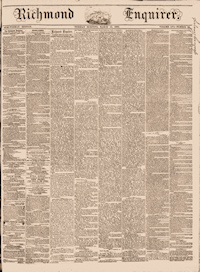June 30, 1863, Richmond Enquirer
The appearance of portions Gen. Dix’s command at the White House and other points on the Peninsula has been, in our opinion, a fortunate circumstance. It has recalled the thoughts of our people from the avocations of trade and money-making to the real business of every man during the continuance of this war, the defence of the city. As soon as it was definitely ascertained that a Federal force of any importance had disembarked at the White House, the citizens of Richmond almost to a man, left business of every kind and organized themselves into companies, battalions, regiments and brigades, selected officers, received arms and ammunition, ascertained their places of rendezvous and their positions in the defences of the city. The first real, actual appearance of the enemy accomplished in one day more than all the proclamations of the authorities would have accomplished in a month. A force of from eight to ten thousand fighting men has thus been added to the army corps that now garrisons Richmond.
This was not the most service rendered the Confederacy by the opportune appearance of General Dix. Brigades and divisions which had been , as it were, lying around loose, have been concentrated at Richmond, ready to meet Dix, should he advance, as well as to follow quick upon his track should he attempt a cross march to Fredericksburg and Acquia Creek, on his way to reinforce Hooker.
The divisions that constitute the army corps of veteran soldiers for the garrison of Richmond, are enured to fatigue and fighting. Victorious in many engagements over their enemy, they will meet him again in the famous fields of the Chickahominy and the Seven Pines, should General Dix advance upon the city. But of this we confess we have but little fears. The absence of General Lee’s army would seem to invite the enemy to attack Richmond; its apparent defenceless condition would make it appear easy to be captured. But General Lee is well known to the officers commanding the United States army; his habit of doing well all that he has to do, as well as leaving undone nothing that will contribute to his full success, is perhaps better understood and appreciated by the enemy than ourselves. Gen. Dix well knows that Richmond would not be left defenceless, even with the positive certainty of the capture of Washington city. The importance of Richmond to the Confederacy is too well understood by the enemy for them to seriously believe it left in a defenceless condition.
With these facts before us, we repeat, we entertain very little fear of any serious advance by Gen. Dix upon the city. But we do apprehend an attempt to march across the country from the White House to Aquia creek, or even by Gordonsville and Culpeper to Hooker’s army. The destruction of the railroads and devastation of the country would be inducement enough to take this route in reinforcing Hooker. The better to cover this movement, Gen. Dix’s rear guard may be thrown out towards Richmond as far as the east bank of the Chickahominy, while the main body ascends the Pamunkey and seeks to break the Richmond and Fredericksburg Railroad between the city and the Junction. If successful in breaking this railroad, Gen. Dix may think himself safe from pursuit by the garrison of Richmond, which being still threatened by his rear guard, would not leave the city, and thus he could overpower the troops stationed for the defence of the railroads, and march at his leisure, devastating the country and destroying the railroads. This we believe to be the real meaning of the landing at the White House, and the march of the enemy’s forces to that point. – If we be right in our conjecture, how far Gen. Dix may be successful remains to be seen.
The army that now garrisons Richmond is competent to meet the enemy – nay more, to advance towards Washington, and play an important part in the capture of that place. Gen. Dix will be so closely and vigilantly watched as to be unable to dodge off in the direction of the upper Pamunkey. His present position is one of safety; protected by gunboats, and contiguous to his transports, he will not, we presume, be attacked by the garrison of Richmond, though the military lately organized by Brigadier General Custis Lee is fully competent to defend the city if the garrison should be sent to drive Dix to his transports.
Without this opportune advance of Gen. Dix to the White House, the Confederacy would have today from eight to ten thousand less troops in service than now swell its ranks. The patriotic rally of the citizens has been beyond precedent even in this war. The gay and happy boy, the man of business, the old men even, of the city, have nobly stepped forward and enrolled themselves. – Behind the excellent defences of Richmond, with its thirty-five hundred trained artillerists of Col. Rhett, these citizens can hold the city against Gen. Dix without the aid of the army corps that has been assembled around the city.
The garrison of Richmond may, therefore, be considered a splendid reserve for the army of Gen. Lee. It may, with safety, move on Washington as soon as Gen. Custis Lee has perfected his newly organized force in drill and manual. The militia of Virginia, lately called out by her Governor, will soon swell the ranks to eighteen or twenty thousand men.
Imagine the consternation at Washington when the news that thirty thousand Confederates were approaching the city by the Warrenton turnpike! Hooker engaged in hunting up Lee, would be unable to detach a force to meet this new army, organized and mobilized by Gen. Dix’s opportune appearance at the White House. We again urge all citizens and the militia of the State to hasten forward their organizations, in order that the army corps now around Richmond may take the field.
